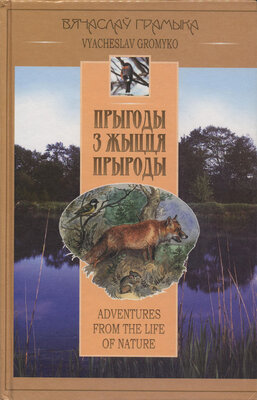Прыгоды з жыцця прыроды
Adventures from the life of nature
Вячаслаў Грамыка
Выдавец: Беларусь
Памер: 263с.
Мінск 2003
of fat, which allows leverets to stay without food for two to three and sometimes more days.
Having sucked milk in plenty, the leverets bunched themselves and kept quiet. Soon the she-hare left them to carry on its kind: summer days ran fast and she had to hurry to bring into the world one, two and even more litters of three to six leverets, out of which not everyone will survive in severe conditions of wildlife.
Meanwhile, the leverets dried well, felt a burst of cheerfulness and force and, one by one, started scattering around. Probably, they would never see each other again and if they will run into one another by chance, none of them would recognize a brother or a sister in its kin.
Having looked around, a leveret noticed that it remained alone, but it did not grow sad, and like all of its kind used to do, it ran to the safest place, a thick coniferous wood. With its weak paws it raked aside shriveled last year's grass and lay down pressing itself against the damp ground. Dampness did not bother it much — thick curly hair protected its body from cold reliably.
The leveret kept quiet, pressed its ears to the back — all the same it could hardly run away from the quick feet of a vixen or a wolf and in that case it had to rely only upon good camouflage. Leveret's eyes remained open all the time and they were peering with particular curiosity and attention at the world, which was new for it.
There, a gray small forest mouse ran nearby, stopped for a moment, shone with its bead-like eyes and deftly whisked into its cozy burrow. At the side a motley woodpecker was tapping on an old conifer. At times it stopped, looked around and then went on tapping with its strong beak. What an odd creature it is! And there a whole train of fast yellow tomtits flew in.
“Ping-ping! Shping! Ping-ping!” they whistled joyfully and cheerfully.
They followed each other from one twig to another looking for bugs and flies.
And somewhere from the other side muted sinister sounds could be heard at times “Khroum-khroum! Khroum-khroum!'” What a horror!
Fussy ants were crawling all around. Dashing on the ground from side to side they had trampled a path for themselves. And so hard-working and strong they were! There, one of them was pulling a piece of a broken twig to its ant hill — it was, perhaps, ten times bigger than itself and it didn't matter for it, a usual business.
The sun began to shine warmer and though its rays could hardly penetrate through thick caps of young pine trees, it was impossible not to feel it. It became hotter, a warm thick evaporation was rising into the air from the damp soil and shriveled foliage. Feathered forest inhabitants were twittering in every possible way. The leveret had clean forgotten about caution, it rejoiced at the generosity of nature and peered all the time at the environment discovering much interesting and mysterious things for itself.
The day passed swiftly, the sun hid itself somewhere, birds’ voices stopped and hard-working ants disappeared in their ant hill. Only the leveret had no place to hide itself and it envied very much a small mouse it chanced to meet in the morning — it lay somewhere in its deep burrow on soft hair or dry leaves — it is warm and comfortable there and the main thing — safe.
Who can reach it? But here every small tree, every old stump and thick small bush are fraught with danger.
It was becoming dark gradually, even contours of trees were getting vague and soon everything was also in a heavy, thick and silent darkness. A dog barked somewhere far away. Barking was ringing angrily and the leveret's narrow back was trembling because of fear. It tried to press against the ground closer.
“Whoop-whoop-whoop!” was heard from the swamp.
“Tr-r-r-r-r... Tr-r-r-r,” could be heard from the top of a tall fir tree.
Sometimes somebody would suddenly burst out laughing:
“Ha-ha-ha-ha-ha!”
It was an owl flowing out for hunting. It looks out fixedly in the darkness for its future victim with its large eyes, which see even at night. And as soon as any small animal or a lonely bird would betray themselves by a careless movement — they are destined to be in the strong claws of the night beast of prey.
So, in fear and expectation, the night elapsed. Dawn broke out again, the environment was returning to life, a new day began. The leveret was motionless, it was sitting still.
All of a sudden it smelt of something unpleasant. The leveret pressed itself against the ground as close as it could. Through narrow slots in the coniferous wood it saw a vixen in the thicket. Skinny and sloppy, with uneven and shaggy hair, it was looking for forest mice. The vixen was unable to notice the motionless leveret, whose fell has no scent at all. Nevertheless, the danger was nearby...
On the third day the leveret felt very hungry. And ho matter how scared it was, it had to leave the chosen place and make at first one rush, then another and the third one. All of a sudden, a she-hare ran out from behind the bush.
It was an alien she-hare and the leveret was taken aback at first, but the she-hare smelt of something native and the leveret dared to push its small muzzle under the soft and wet hair of the stranger. The she-hare was not embarrassed by the impudence of an alien leveret, because it is common in hare's world that leverets are fed not only by the mother, but an alien she-hare as well. This food would be enough for three days for a leveret. Then feedings were repeated several times more and on the tenth day or so the leveret had his sharp small teeth cut and it began nibbling young shoots, sweet roots and soft rind of young trees itself.
At first it was a bit difficult. Young grass just began to shoot and it had to spend more than an hour to satisfy hunger and shake thirst. Often it had to be content with sweetish roots, which it managed to rake off with its small paws in those places where the ground was mellow and soft.
But soon first small leaves appeared on low bushes. The food became more diverse.
Gradually the leveret got accustomed to night darkness and even gave preference to it while searching for food. As soon as the night fell onto the ground, it worked its way to a green forest clearing and ate its fill with fresh juicy grass. The leveret also liked astringent branches of a bilberry bush.
Occasionally it called on the nearest upper swamp and jumping from hummock to hummock, it reached its most favorite delicacy — extremely sweet and appetizing sedge, which it could eat in abundance, almost on the spot.
During the daytime the leveret lay low in the forest changing its rest place from time to time. Now it would get a place by an old grey stump in the thicket, then would stay the day in the thick coniferous wood or lie under a low nut tree in the gully overgrown with bushes.
Gradually, the leveret learnt to entangle its tracks so as not to get into the paws of enemies. He had to be on its guard against wolf and lynx, fox and raccoon dog, polecat, hawk, big owls and, at that time, also against smaller beasts of prey. When the time for day's rest came, the leveret would begin to be cunning, make “doubling” (repeatedly walking along its trace and, finally, jumping aside), lie without further rushes and unnecessary movements.
In a month the leveret has grown up, became a brisk and slim hare. The hare was fattening at night and rested during the day, hid itself from predators, grew and got used to the circumstances of life as best as it could. Now it came out to the edge of the forest where crops grew, sometimes it even ran to the large forest clearing where there were grassy cereals and tasty shoots of aspen.
After the night “ball” the hare liked to jump around, roll with pleasure on tickling branches of cereal grasses — they imparted unusual pleasant lightness and satisfaction. Occasionally, other similarly self-willed hares called on the clearing and the hare played with them with pleasure; they were racing with one another, played and again scattered by the morning.
One night the hare got on a glade, refreshed itself a bit with forest motley grass and decided to make for a distant clearing which it had not called on for several nights already. Two grey hares had been already feeding on it. They regaled themselves on juicy grass, tore appetizing small leaves off young aspens, scraped rind off young bushes of rod with their small teeth. Then they started their games: they were running one after another in small circles, jumping up, scattering about the
clearing stopping for a moment and examining each other with curiosity.
When hares, having forgotten about the caution, found themselves in the middle of a vast clearing an owl came flying. Young hares rushed to different directions headlong, trying to reach the saving forest.
The hare ran as quickly as it could, as never in its life, jumping over from one hammock to another, it even got over small bushes with one lengthy leap.
A night shadow lightly floated quite near, just over the head, terrifying flaps of huge wings were heard. One more moment — and it will snatch the helpless hare and carry it into the branches of century-old trees.
But, in the last instant the hare jumped aside sharply. The owl has flown by.
It gave strength to the hare and it took to its heels, trying to get to the saving thick forest bushes as soon as possible.
The owl gained height quickly and started a new attack. Now it was flying very low, so low that it was dangerous to jump up high — you would fall into talons yourself or get under the stroke of a strong beak. Again, terrifying flaps of wings were heard nearby, it seemed that talons were just about to dig into the grey small back. Where is the escape? And when the owl already took aim at the victim with its talons, the hare slipped into the brushwood. The blow of a strong paw was immediate both on the brushwood and on the hare.
Feeling an acute pain in its head and neck, the small hare dashed forward with all its forces and took to its heels.
 КНІГІ ОНЛАЙН
КНІГІ ОНЛАЙН


